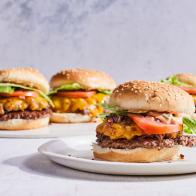How to Tell If You're Losing Weight Too Fast
Rapid weight loss can be unhealthy and dangerous. A nutritionist shares a safe (and more effective) method.

fabrycs/Getty Images
Have you ever seen ads promising that you’ll lose a lot of weight in a short period of time? As a registered dietitian that drives me bonkers! The cliche phrase is really true: Slow and steady wins the race. However, there are many other reasons you shouldn't try to shed pounds too quickly including nutrient deficiences and weight gain later on. Below, we break down the risks of losing weight too fast and how to make sure you're losing weight (if that's a goal for you) at a healthy rate.
Why Quick Isn’t Always Healthy
To lose weight quickly you usually have to significantly cut back on calories. When you cut calories too low (less than 1,500 calories a day for most women, or 2,000 calories for most men) you end up losing the wrong kind of weight – muscle, instead of fat. Plus, it doesn’t teach you healthy eating habits, and can cause people to give up on their weight loss goals and go back to old eating habits. This can lead to gaining all the weight lost (plus some) back, and tends to be a pattern with those who yo-yo diet. If you do choose to go on a very low calorie diet or other such weight loss plan, it should be discussed with an RD and supervised by a medical professional team.
Losing weight too fast also might mean you're cutting out too many nutrients, which means your body isn’t getting proper nourishment. Gallstones are also a concern for folks who lose large amounts of weight over a period of several months. Your blood pressure can drop if you also lose weight too quickly, which can be dangerous. Dehydration and electrolyte imbalance can also occur. Other side effects of quick weight loss include dizziness, constipation, hair loss, headaches, irritability, fatigue, and muscle loss.
How To Safely Lose Weight
The National Institutes of Health (NIH) recommend a safe rate of weight loss, which is about 1 to 2 pounds per week for a period of six months. In order to lose weight, the NIH recommends cutting back on both fat and carbohydrates (not cutting them out completely) in order to help reduce overall calories. In addition, behavior therapy (like creating healthy habits) should be incorporated in a healthy weight loss plan.
The NIH also stresses that “physical activity should be part of a comprehensive weight loss therapy and weight control program.” This is because physical activity can modestly contribute to weight loss, specifically in those who are overweight and obese. Physical activity may also help decrease abdominal fat, and increase cardiovascular fitness, and may also help with weight maintenance after you lose weight. The NIH recommends moderate levels of physical activity for 30 to 45 minutes, 3 to 5 days a week.
After the weight is lost or after six months (whichever comes first), it’s important to go on a weight maintenance program. The NIH suggests that weight maintenance is most successful when it combines a healthful diet, regular physical activity, and healthy changes to behaviors.
Bottom Line: Quick Fixes Don't Work Long-Term
Be wary of those quick fix diets that promise speedy rates of weight loss. Not only are they unhealthy, they can be dangerous. If you need more guidance to help lose weight, you can find a registered dietitian in your area by going to the Academy of Nutrition & Dietetics website and clicking on the banner “Find A Nutrition Expert.”
Toby Amidor, MS, RD, CDN, is a registered dietitian and consultant who specializes in food safety and culinary nutrition. She is the author of The Greek Yogurt Kitchen: More Than 130 Delicious, Healthy Recipes for Every Meal of the Day.
*This article was written and/or reviewed by an independent registered dietitian nutritionist.
Related Links:


































